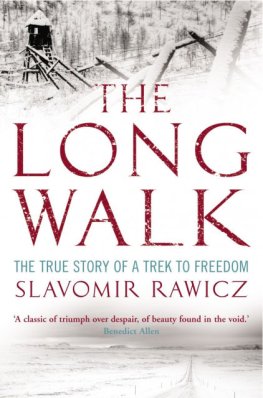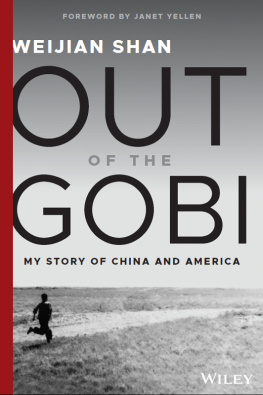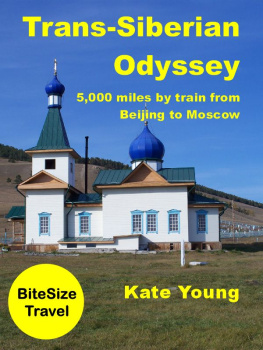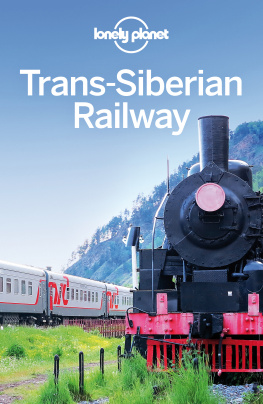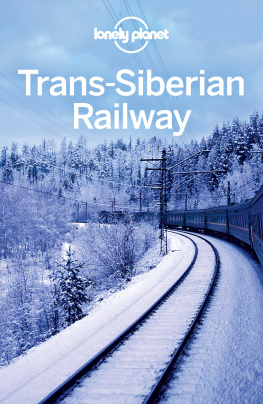SLAVOMIR RAWICZ (19152004) lived in England after the Second World War where he met and married his wife Marjorie. They had five children and lived in the countryside of Derbyshire. Slavomirs ill health led to an early retirement during which he gave many talks about his experiences, raising money for orphans in Poland. He also corresponded with people throughout the world who were inspired by his story.
THE LONG WALK
The True Story of a Trek to Freedom
SLAVOMIR RAWICZ
ROBINSON
London
Constable & Robinson Ltd
3 The Lanchesters
162 Fulham Palace Road
London W6 9ER
www.constablerobinson.com
First published in the UK by
Constable and Company Ltd 1999
This paperback edition published by Robinson, an imprint of Constable and Robinson Ltd 2000, 2007
Copyright Slavomir Rawicz 1956
The right of Slavomir Rawicz to be identified as the author of this work has been asserted by him in accordance with the Copyright, Designs and Patents Act 1988.
All rights reserved. This book is sold subject to the condition that it shall not, by way of trade or otherwise, be lent, re-sold, hired out or otherwise circulated in any form of binding or cover other than that in which it is published and without a similar condition including this condition being imposed on the subsequent purchaser.
A copy of the British Library Cataloguing in Publication Data is available from the British Library.
ISBN 978-1-84529-644-5
Printed and bound in the EU.
1 3 5 7 9 10 8 6 4 2
Slavomir Rawicz acknowledges his debt to Ronald Downing who helped him write the book.
Contents

1
Kharkov and the Lubyanka
I T WAS about nine oclock one bleak November day that the key rattled in the heavy lock of my cell in the Lubyanka Prison and the two broad-shouldered guards marched purposefully in. I had been walking slowly round, left hand in the now characteristic prisoners attitude of supporting the top of the issue trousers, which Russian ingenuity supplied without buttons or even string on the quite reasonable assumption that a man preoccupied with keeping up his pants would be severely handicapped in attempting to escape. I had stopped pacing at the sound of the door opening and was standing against the far wall as they came in. One stood near the door, the other took two or three strides in. Come, he said. Get moving.
For me this day twelve months after my arrest in Pinsk on 19 November 1939 was to be important. I was being marched off to my trial before the Soviet Supreme Court. Here in Moscow, shambling through the echoing narrow corridors of the Lubyanka between my two guards, I was a man almost shorn of identity, ill-fed, abysmally lonely, trying to keep alive some spark of resistance in the dank prison atmosphere of studied official loathing and suspicion of me. Just a year before, when the Russian security men walked into the welcome-home party my mother had arranged for me in the family house at Pinsk, I was Lieutenant Rawicz of the Polish Cavalry, aged 24, slim and smart in my well-tailored uniform and whipcord breeches and shining riding-boots. My condition now was a tribute to the unflagging brutalities and the expert subtleties of N.K.V.D. (Soviet Secret Police) interrogators at Minsk and Kharkov. No prisoner can forget Kharkov. In pain and filth and degradation they try to turn a man into a whimpering beast.
The air struck chill as we turned a last bend in the corridor, walked down some steps and emerged into a cobbled courtyard. I gave my trousers a hitch and stepped out to keep up with my guards, neither of whom had spoken since we left the cell. On the other side of the yard we pulled up in front of a heavy door. One of them pulled me back a pace by tugging at the loose unfastened blouse which, with the trousers, formed my prison outfit. They stepped up as the door opened, jogging me forward into the arms of two other uniformed men who quickly ran their hands over me in a search for hidden weapons. No word was spoken. I was escorted to another door inside the building. It opened as though by some secret signal and I was pushed through. The recess of the door on the inside was curtained and I was shoved through again. The door closed behind me. Two guards, new ones this time, fell in behind me at attention.
The room was large and pleasantly warm. The walls were cleanly white-painted or whitewashed. Bisecting the room was a massive bench-type table. On this side, bare of the smallest stick of furniture, I and the guards had the whole space to ourselves. Ranged along the other side of the table were about fifteen people, about ten of them in the blue uniforms of the N.K.V.D., the rest in civilian clothes. They were very much at ease, talking, laughing, gesticulating and smoking cigarettes. Not one of them spared me even a casual glance.
After ten minutes or so I shuffled my feet in their canvas shoes (they had lace-holes but no laces) on the polished wooden parquet floor and wondered if a mistake had been made. Somebody has blundered, I thought. I shouldnt really be here at all. Then an N.K.V.D. captain looked our way and told the guards to stand at ease. I heard their boots thump behind me.
I stood there trying not to fidget, and looked round. I surprised myself with the discovery that for the first time in weary months I was faintly enjoying a new experience. Everything was so clean. There was a comforting air of informality all round. I was almost in touch with the world outside prison walls. In and out of the room passed a steady stream of people, laughing and chatting with the crowd behind the table, elbows sprawling over the magnificent red plush covering. Someone asked when an N.K.V.D. major expected to get his holidays. There were happy inquiries about someone elses large family. One man, impeccably dressed in a Western-style dark grey suit, looked like a successful diplomat. Everyone seemed to have a word for him. They called him Mischa. I was to remember Mischa very well. I shall never forget him.
On the wall facing me on the other side of the table was the Soviet emblem, cast in some kind of plaster and lavishly coloured. On each side of it were the portraits of Russian leaders, dominated by a stern-faced Stalin. I was able to look round now with frank interest. No one bothered me. I switched my trousers grip from my left hand to my right hand. I noted there were three curtained doorways into the room. There was a single telephone, I observed, on the long table. In front of the central position on the great table was an old-fashioned solid brass pen-stand in the form of an anchor and two crossed oars, with a glass inkwell, both standing on a massive marble or alabaster base.
And all the time the everyday conversation flowed across to me from the other side of the table and I, to whom no single kind word had been spoken for a year, who had drifted deeper and deeper into isolated depression under the rigidly-enforced prison rule of absolute silence, felt this was a most memorable day.
Standing there in my dirty, shapeless, two-piece prison rags, I was not conscious of any sense of incongruity before the cheerful and well-dressed Russians. The fastidious pride of the Polish cavalry officer had been the first thing they attacked back in Minsk ten months before. It was a callous public stripping, the preliminary to my first interrogation. The Russian officers lolled around smiling as I was forced to strip off my uniform, my fine shirt, my boots, socks and underwear. I stood before them robbed of dignity, desperately ashamed, knowing fearfully that this was the real start of whatever foul things were to befall me. And when they had looked me over and laughed and finally turned their backs on me, then, a long time afterwards, I was thrown my prisoners trousers and
Next page

